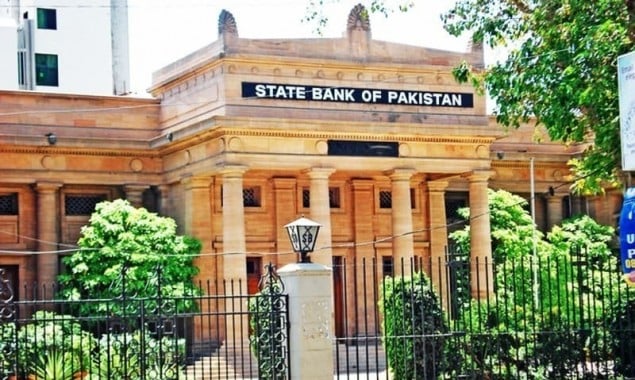
State Bank of Pakistan. Image: File
KARACHI: The State Bank of Pakistan (SBP) has said that FY21 remained a particularly challenging year, as the global economy adjusted to the economic and financial challenges posed by the Covid-19 pandemic, including multiple waves of virus outbreak and ensuing containment measures.
“Amid such testing times; however; Pakistan’s economy rebounded strongly compared with the previous fiscal year, as well as in comparison with the targets set for FY21 at the beginning of the fiscal year,” the SBP said in a statement on Friday.
The board of directors of the State Bank of Pakistan on October 26, 2021 approved the annual performance review on the working of the bank and its subsidiaries and the financial statements for the year ended June 30, 2021.
The SBP’s supportive monetary policy stance, including quantitative measures to inject liquidity in a timely manner, supplemented by the fiscal policy measures, provided a targeted, dynamic and well-coordinated policy response to the Covid.
These measures helped address the imminent liquidity and solvency concerns of businesses and households that had been emerging since the virus outbreak in March 2020 and supported the better-than-anticipated economic performance during FY21.
The economic growth rebounded to 3.94 per cent during the year, well above the target set for the FY21 of 2.1 per cent and the Covid-induced contraction of 0.47 per cent in FY20.
The inflation also moderated to 8.9 per cent in FY21, well within the target range of 7 per cent and 9 per cent announced by the central bank.
Similarly, other key macroeconomic balances, including current account, fiscal balance and the country’s foreign reserves improved during the FY21.
The SBP’s quantitative measures were well-targeted, well-diversified across beneficiaries and temporary in nature; and in aggregate provided liquidity support of around 5 per cent of GDP.
To ease off the challenging business environment, the SBP swiftly introduced concessional refinance schemes to prevent layoffs (Rozgar Scheme); facilitate healthcare institutions to upscale their facilities (Refinance Scheme to Combat Covid); and encourage firms to undertake long-term investments (under the Temporary Economic Refinance Facility).
The export-related procedural requirements were relaxed to counter the limited mobility, amid unfolding national lockdowns and scope for concessionary Export Finance Scheme (EFS) was expanded.
In addition, the SBP allowed bank’s loan restructuring and loan deferment for firms, including the Small and Medium Enterprises (SMEs) and households.
Further, the anchoring of inflation expectations, despite some upward pressures from the supply management issues and surge in the international commodity prices, allowed the Monetary Policy Committee (MPC) to keep the policy rate unchanged throughout the year.
The adoption of forward guidance on the monetary policy by the SBP since January 2021 played a major role in reducing the short-term policy uncertainty for the stakeholders.
Pakistan’s external indicators also improved significantly in FY21, as the central bank’s foreign exchange reserves grew more than 40 per cent and the country’s current account deficit plummeted to a 10-year low, mainly because of the record high workers’ remittances and export receipts.
While the market determined exchange rate improved export competitiveness, the financial incentives announced by the SBP and the government for remittance processors under the Pakistan Remittance Initiative (PRI) encouraged the use of formal banking channels for remitting funds by immigrants, which paved the way for increasing inward remittance to $29.4 billion during the year.
With regard to payments infrastructure of the country, the central bank undertook major initiatives aimed at financial inclusion, digital onboarding of the customers, enabling remote banking, providing digital modes of investments to the customers through banking channels and improving the payment systems efficiency.
First, the SBP in collaboration with the government and commercial banks launched Rohan Digital Account (RDA), allowing non-resident Pakistanis to open and operate bank accounts remotely with the banks in Pakistan, invest in Naya Pakistan Certificates (NPCs), stock market, mutual funds, real estate and to purchase cars for their family members.
The initiative was well-received by the Pakistani diaspora, as by the end June 2021, $1.56 billion have been received via 181,556 RDAs. This influx of foreign exchange has positively supported the country’s balance of payments position. The SBP’s second major undertaking in the payments sphere, is the launch of the first use case of Raast, a state-of-the-art, interoperable and secure payment platform that enables consumers, merchants and government entities to exchange funds in a seamless, instant and cost-effective manner.
Both the developments in the payment systems domain will have a lasting impact on Pakistan’s banking landscape, as well as external account.
Financial inclusion remained top strategic priority at the SBP, in line with the vision of the National Financial Inclusion Strategy.
During FY21, the SBP’s special focus remained on rural, underserved and unbanked areas, while issuing licences for opening new branches of commercial and microfinance banks. With regard to credit disbursement, the central bank had a renewed focus on underserved economic segments, especially housing and construction finance, agriculture finance, and finance for micro, small and medium enterprises.
Moreover, the third five-year strategic plan for the Islamic banking industry was issued in April 2021 to set a strategic direction and strengthen the existing growth momentum of the industry.
With respect to its regulated entities, during FY21 it implemented risk-based supervision framework, a forward-looking framework that would allow the SBP to pursue a coherent risk-based approach through proactive identification of risks, and take timely mitigation measures to ensure financial stability in the country.
To achieve its broad strategic goals and strengthen the organisational efficiency, the central bank took major initiatives during FY21 aimed at workforce rationalisation, attaining gender diversity, automation of process workflows, strengthening cyber-security and risk management framework and improving transparency through enhanced communication with the external stakeholders.
The annual performance review, including financial statements of the bank and its subsidiaries and the auditor’s report thereon for FY21, has been released to the public and transmitted to the federal government pursuant to Section 40 (2) of the State Bank of Pakistan Act, 1956.
Catch all the Business News, Breaking News Event and Latest News Updates on The BOL News
Download The BOL News App to get the Daily News Update & Follow us on Google News.




